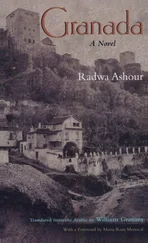By nine o’clock in the evening Nadeem had not appeared, so I began ringing up such friends of his as I knew. Some of them said, ‘We haven’t seen him in days.’ Others said, ‘We were together when the march set off from Al-Azhar Mosque. It was a big demonstration — security couldn’t break it up until they set the police dogs on us and brought in special forces. We started running — we spread out into the alleyways and neighbourhoods, then came back and regrouped. When we moved from Al-Azhar Street to Ataba Square and from there to the city centre, we didn’t see him — nor when we got to Tahrir Square. It was a big crowd, and we thought he must have gone in a different direction, away from the square.’
I rang up contacts of my own who I thought might have news about arrests or injuries. No news yet.
Hamdiya would not stop crying. ‘Maybe they beat him at the demonstration,’ she said, ‘and he fell and got trampled. Or maybe,’ she added, ‘he was wounded and the police took him to the hospital. We must ask at the hospitals,’ she said, and then, ‘We should call Nadir to come and look for his brother.’ She went on and on, and I shouted at her, telling her to be quiet so I could carry on with my telephone calls and inquiries.
She wouldn’t calm down. I decided to go look for him. I went out with her, muttering to myself that she was an insufferable woman. We stopped in at the hospitals, starting with the Es‘aaf Hospital and ending with Kasr al-Aini. At the first hospital Hamdiya lost no time asking about the wounded youths who had been beaten by the security forces during the demonstrations. I took her forcefully by the arm and whispered in her ear, ‘They’re not going to answer that question for you. We should ask whether a young man came to their emergency room hurt or wounded. We’ll give them his name and description.’
We checked the emergency rooms from one hospital to another, in Al-Azhar, Ataba, and Ramses, and then we moved on to Kasr al-Aini.
When we got home I said to Hamdiya, ‘Your idea wasn’t a good one, Hamdiya.’ She was still crying.
I went back to telephoning people I imagined might have information. After that there was nothing we could do but wait. I made two cups of tea and turned on the television to see whether there was any fresh news. Around noon the telephone rang. It was one of the friends I had rung up earlier. He said, ‘Nadeem was one of the young men who were arrested. We sent several lawyers to the stations to find out where each person had been taken. We were told that they may appear before the investigator tomorrow afternoon. I’ll get confirmation and let you know. We’ll stay in touch.’
I conveyed all this to Hamdiya.
What happened then was the last thing I expected. It would never have crossed my mind that it could come to such a scene as what ensued upon that conversation. Hamdiya’s face, already flushed from weeping, turned a still deeper red, and she began yelling at me, ‘It’s your fault! This is what comes of your talking to the boys about politics, all your droning in their ears. You’ve destroyed our household and lost us Nadeem. As soon as he comes home safe and sound and goes to Dubai I’m going to move in with my sister. Then we can go our separate ways.’ She blew her nose, wept, and kept up her bizarre talk. I didn’t know whether I should slap her across the face, shout at her the way she was shouting at me, or go out and leave her.
I ignored what she had said. I turned up the volume on the television and started watching the first press conference with Tommy Franks, the leader of the operations. He was saying, ‘… this will be a campaign unlike any other in history, a campaign characterised by shock, by surprise, by flexibility, by the employment of precise munitions on a scale never before seen, and by the application of overwhelming force… Our troops are performing as we would expect — magnificently.’ A column of armoured vehicles crossing the desert. Huge balls of fire against a background of smoke and palm trees. American soldiers on the deck of an enormous battleship, cheering at the launch of the opening volley of tomahawk missiles. Tony Blair declaring that the Iraqis were an oppressed, humiliated people, and that Britain and her allies would bring them democracy and prosperity, and would protect their oil wells and refineries.
The following afternoon, we were unable to see Nadeem or any of his mates who had been brought in transport lorries to the national security courthouse, even though Hamdiya and I, along with other family members of the detainees, had gone early to the courthouse and spent two hours waiting on the pavement opposite the building. The blue lorries arrived, and queued so as to reverse in the direction of the door through which the boys would pass; thus they exited the vehicles and entered the building without anyone on the street seeing them.
It was then that I remembered, and knew that I had had a premonition of this moment when, months before, I had been following the transport lorries. My heart had told me. I would be following a lorry and staring through the opening and the heavy grillwork covering it, that I might catch sight of Nadeem’s face, or he might see my face smiling at him.
The families were permitted to enter the building and wait in the lawyers’ chamber. We saw the boys climbing to the upper floor to be interrogated, and then we saw them coming back down, toward the lorries. Then we were allowed to stand near the lorries, where we waved farewell to them, and they waved back at us, each one raising his two hands together to wave, for their wrists were shackled together by an iron cuff.
By the time Nadeem and his mates were released, Baghdad had fallen, and the Americans and the British had occupied Iraq. Two weeks later Nadeem left for the Emirates to work in Dubai and join his brother. He travelled on Tuesday afternoon. Hamdiya followed through on what she had said when she was shouting and crying like a madwoman, on that sad Mother’s Day: she collected her things and moved in with her sister. On Thursday evening I got dressed and went to the New Generation Centre in Ain al-Sira to attend a belated ceremony that had been organised for Siham.
The hall was jammed with her friends and acquaintances, most of whom had taken part in the student movement, some from the College of Engineering or from other colleges, as well as cohorts from the period when she had studied in the Soviet Union, and others whom she had met at one time or another, leaving an impression upon them that drew them — despite the passing of the years and her protracted seclusion — to come and bid her a final adieu. Life in general — in our part of the world, at any rate — combines the funny with the sad, mixing the momentous with contrasting humour and whimsy, and so it was that a bunch of middle-aged people entered the hall, bearing the unmistakable signs of lives lived in trying and difficult circumstances. They were not shy about introducing themselves: they were the students who worked for the government, in the nineteen seventies, against the student protesters. Some of them had partaken in that memorable event at the College of Engineering, the day they surrounded Siham with clubs, insulted her, and told her, ‘Get out, and don’t open your mouth in this college’; whereupon she sat down on the floor and said, ‘This is my college, and I’m not leaving. And I’ll speak up here whenever I like. You want to beat me, then beat me.’
They revisited this tale, saying, ‘May she rest in peace.’ They said she was courageous, and had earned respect. It was clear from the expressions on their faces that they were genuinely affected by her death.
Chapter twenty-four
Siham
Her picture is on the front page of the book. Most likely it is a picture of her when she was still in high school, her first year there. She is wearing a dress that looks more like a school uniform, with buttons in the front and a round collar, one of those types known as a ‘baby collar’, maybe because of its association with children’s clothing. Her hair is smooth, thick, and long, parted in the middle and falling to her shoulders, but not covering her forehead or her ears. Her complexion is white, her eyes light-coloured (the picture is black-and-white, and so doesn’t reveal the green of her eyes). A long face with a broad brow, a small nose, and somewhat full lips; her face has grace and a sweetness, or innocence, or gaiety hiding behind an apparent seriousness and visible placidity. There is perhaps also a touch of sadness in this face, betrayed by a slight cast to the right eye that you wouldn’t notice if you didn’t look closely. In her ears are earrings, circular in shape — are they gold or silver? In a black-and-white photograph you can’t tell for sure. A child, a girl, and a woman in the making converge in the picture.
Читать дальше











